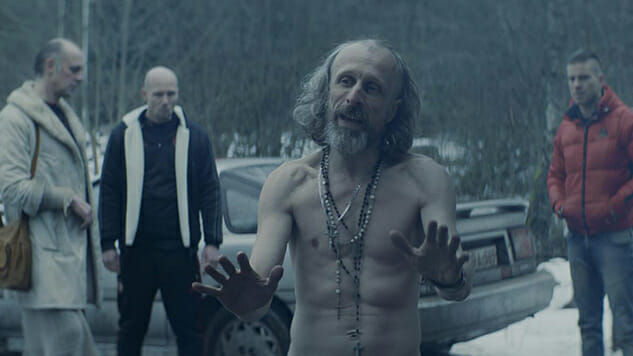
If nothing else, last year’s Hell or High Water offered an object lesson in how a welcome attention to detail can help refresh genre clichés, turning character archetypes into people we respond to as flesh-and-blood human beings. Sadly, The Ardennes—a new Belgian crime thriller from co-writer/director Robin Pront, making his feature debut—demonstrates precisely the opposite: just how hoary genre conventions can feel in the hands of filmmakers who either seem unaware that they’re working with boiler plates, or who pretend they don’t exist.
You’ve seen much of this before: the former criminal who desires to turn away from a life of crime; the hotheaded brother who comes out of prison and threatens to drag his sibling back down into the criminal muck; the love interest who represents the kind of stability one brother craves and the other frequently denies. In Pront’s banal vision of twisted family values, though, even the eccentric supporting characters—most notably, a fellow prisoner of the hotheaded criminal brother and his cross-dressing henchman—feel warmed over from Quentin Tarantino and Coen brothers movies.
Actually, those two supporting characters are worth dwelling on briefly, because they suggest the closest the film comes to thematic depth. One of them, Stef (Jan Bijvoet), is first introduced in passing in the film’s opening minutes as the cellmate of Kenny (Kevin Janssens), who has just been sentenced to seven years in prison for participating in a robbery from which his brother Dave (Jeroen Perceval, also the film’s co-screenwriter) and his girlfriend Sylvie (Veerle Baetens) escaped. Stef then reappears about two-thirds of the way through the film, freed, living in the titular Belgian forest with Joyce (Sam Louwyck). Though both of those character names sound conventionally feminine, only Joyce maintains a woman’s appearance. By contrast, Stef is hyper-masculine not only in presentation, but in worldview, one that he most directly articulates in a screamingly misogynistic monologue to Kenny and brother Dave, comparing women to female cranes in order to justify calling them all man-eating whores. These characters, and that moment in particular, aren’t the only ones in The Ardennes who suggest a film that is, in part, a critique of machismo. Kenny at one point justifies a murderous act to his brother by asking, “Do you know how it feels to be humiliated by a woman?” Even Sylvie—who is secretly carrying on an affair with Dave—calls Dave a “wimp” for not immediately telling his brother about their relationship.
But then, if Stef is supposed to be some kind of icon of dangerous hyper-masculinity, why is he hanging out with someone like Joyce in the first place? This is just one of many questions begged by Pront and Perceval’s script, which is chock full of such half-baked notions thrown out willy-nilly. It’s likelier that such characters are there simply so that The Ardennes can suddenly morph into a black-comic variation on Fargo in its third act, complete with a climax featuring body dismemberment played for yucks. Worse than such emptily whimsical gestures, however, is the way character psychologies lapse into incoherence and, eventually, inconsequence.
Pront and Perceval never offer us any compelling reason to emotionally invest in these over-familiar characters’ fates anyway. By the time its third act rolls around, Kenny and Dave begin to engage in a series of recriminations and betrayals more mandated by a twist-happy script rather than seeming organic to these people. In the end, The Ardennes leaves us with little more than an un-edifying wallow in ugliness, illuminating little about family relations or the kind of masculinity in which it spends so much time entrenched.
Director: Robin Pront
Writer: Jeroen Perceval, Robin Pront
Starring: Kevin Janssens, Jeroen Perceval, Veerle Baetens, Jan Bijvoet, Sam Louwyck, Viviane de Muynck
Release Date: January 6, 2017
Kenji Fujishima is a freelance film critic, contributing to Slant Magazine, Brooklyn Magazine, The Playlist and The Village Voice. He is also Deputy Editor of Movie Mezzanine. When he’s not watching movies and writing and editing film criticism, he’s trying to absorb as much music, art, and literature as possible. He has not infrequently been called a “culture vulture” for that reason.